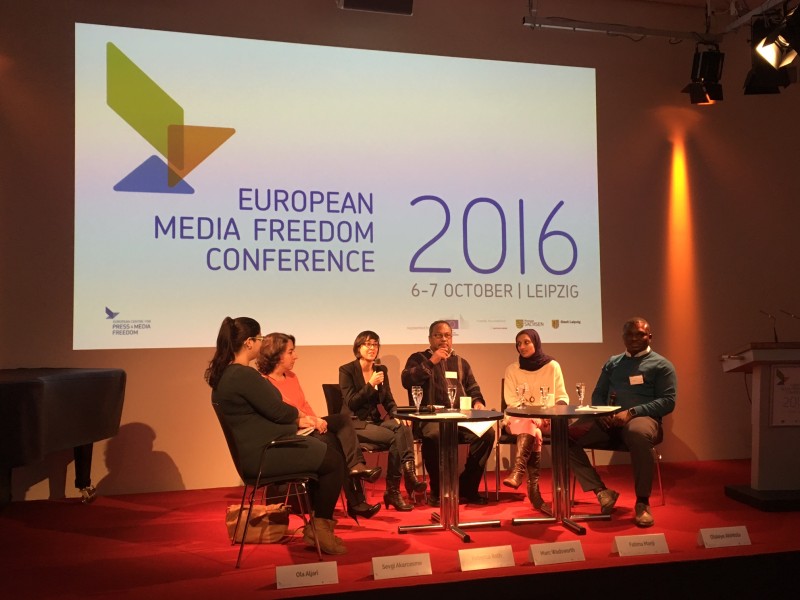Text by Triin Ilves
Photos by Triin Ilves and Jonathan Hendrickx
It’s an age-long question for most of the journalists: how to publish your stories? However, for journalists with a migration background, the reality – becoming integrated into European news media – is far more complicated as they have to adjust to the new society.
The next session of @ECPMF will focus on journalists with a migration background, and will start at approximately 14h. #ECPMF2016 pic.twitter.com/z9cclQkx0g
— Orange Magazine (@EYP_Orange) October 6, 2016
How can journalists with a migration background be integrated into European news media?
One way to do it, is to do it yourself, explaned Marc Wadsworth, one of the founders of The-Latest.com. Being fed up with the existing media, he and two of his collegaues with a Carribean background created a website that is Britain’s first dedicated citizen journalism portal, offering the opportunity to correspondents around the world, he added.
As an editor of the platform, Wadsworth is familiar with the everyday struggles of a journalist, who is both looking for ways to express their views as well as trying to make a living. When asked him, how have they funded their activities, Wadsworth replied simply: “Out of our own pockets.”
Whereas citizen journalism has become an opportunity to many, the one’s with already established journalistic careers have to find new, often international, media outlets when publishing articles in their home country is made impossible. Alternatively, many journalists around the world are constantly threatened because of their written words.
“We are dealing with very hardcore basic rights,” said Sevgi Akarcesme, a Turkish journalist in exile.
Akarcesme shared her own experience of she had to leave her country, once known as a poster child of Islamic democracy, in order to stay independent and unharmed.
“Luckily, the Erdogan supporters are ignorant enough,” she noted, referring to the fact that she can still tweet in English, but her Turkish Twitter account was receiving constant death-threats.
She had to make a decision to leave the country with only in a matter of hours. Leave everything behind and move abroad. Now, Akarcesme added, many Turkish journalists can’t even follow suit. “They’re living in an open-air prison,” she said. Not detained, but they can’t leave the country either, Akarcesme explained.
Ola Aljari, a Syrian refugee-journalist, has left the country for similar reasons as Akarcesme. Aljari, who has the experience of becoming a refugee also in legal sense, is one of the lucky ones who was still able to continue her career as a journalist.After moving to Germany, she’s now working for the ECPMF.
Explaining the bottlenecks of “becoming” a journalist in Europe again, Aljari shared a number of them. First – the language.
„When I’m writing in Arabic, I feel free as a bird,“ said Aljari. When writing in English or German, one is, however, trying to reach out to a whole different crowd, she added. Working together with European journalists, the refugee journalists are able to speak their mind more easily, Aljari explained.
The European Media should realise the potential of working with refugee journalists, repeated Fatima Manji, a Channel 4 News Correspondent. Who has the power to tell „our“ stories, she asked.
A pertinent question by @Channel4News news anchor @fatimamanji: “When does one stop being a migrant?” @ECPMF #ECPMF2016
— Orange Magazine (@EYP_Orange) October 6, 2016
Defining one of the main problems of today’s media organisations, Manji addressed the need for a more diverse newsroom. It’s not only the articles that cast the refugees either villains or victims, but the unequal treatment and prejudices have impacted the recruitment processes, too.
Giving an example of her colleague, Manji explained that a journalist with a foreign background is more likely distrusted or not treated equally purely because of his background and the assumption that he or she is up to no good.
The change? The new recruits have to be different from the ones the newsroom already has, she added. It’s not only because we need diversity, but we also need to have the facts right, said Manji.











